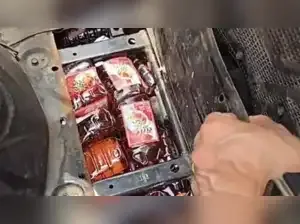Wearing a red T-shirt and an orange delivery bag, Dashrath Kumar looked like just another food delivery worker navigating the chaos of Delhi’s roads. But hidden inside that bag wasn’t a burger or parcel—it was illegal liquor, reported TOI.
Unbeknownst to many, Kumar was under police surveillance, part of a growing crackdown on a bootlegging racket using delivery workers as unsuspecting mules. When he was finally stopped, a significant quantity of illicit alcohol was seized.
An unlikely crime network
Kumar isn’t alone.
Another man, Sourabh, who worked with a major e-commerce platform, had started delivering alcohol to earn extra money. That decision eventually led to his arrest.
According to the report, just days ago, 25-year-old Khurshid was caught red-handed in southeast Delhi’s Govindpuri. His unusually heavy e-cart bag held 400 bottles of liquor labelled “For sale in Haryana only.”
These cases point to a troubling trend—bootlegging rings are increasingly recruiting gig workers who move through the city unchecked and unnoticed.
A spike that’s hard to ignore
This isn’t a one-off problem. Delhi has seen a dramatic increase in Excise Act cases—2,496 in the first quarter of 2025 alone. That’s an 80% jump from the same period in 2024, which had seen only 1,382 such cases. Compared to 2023, the rise is a massive 75%.
Most of the contraband is low-cost local liquor, sold in 180ml bottles for as little as ₹50. Their small size and high margin make them easy to smuggle and very profitable. Branded alcohol like rum, vodka, and whiskey also finds its way in.
For those willing to take the risk, the payout can be tempting. Police say drivers are paid up to ₹30,000 per trip to transport cars stuffed with liquor, with crates filling both the boot and back seat. With that kind of money, the supply of willing carriers never dries up, TOI further reported.
Where it’s coming from
Most of this liquor flows in from Haryana, slipping through border points like Bajghera, Jharoda, Surakhpur and Dhansa—all feeding into the Dwarka region.
Police data shows:
Smuggling gets creative
The traffickers aren’t short on imagination. "We’ve seen everything from sedans and trucks to e-carts and ambulances being used to transport liquor," a senior officer told the news outlet.
But enforcement is getting smarter. In Dwarka, police have installed Automatic Number Plate Recognition (ANPR) cameras that track vehicle movements and flag suspicious patterns.
“Let’s say a car enters Delhi from Gurgaon at 9:50 pm and exits at 11:30 pm. That short window raises a red flag for us,” DCP Ankit Singh further told TOI. “Now, our teams get real-time alerts and can intercept quickly.”
Recently, a spike in bike traffic from Gurgaon also drew attention. Plainclothes teams began monitoring hotspots like Bahadurgarh and Shidipur-Lowa more closely, especially near warehouses and transport yards.
Targeting the supply chain
Officers have started using decoys in areas like Najafgarh and Kapashera, attempting to reach deeper into the supply network. But seasoned bootleggers remain cautious—avoiding direct sales and only dealing with people vouched for by trusted contacts.
“We’re adapting every day, but so are they,” an inspector involved in the operations also told TOI. “Every time we block one route, they open another.”
Unbeknownst to many, Kumar was under police surveillance, part of a growing crackdown on a bootlegging racket using delivery workers as unsuspecting mules. When he was finally stopped, a significant quantity of illicit alcohol was seized.
An unlikely crime network
Kumar isn’t alone.
Another man, Sourabh, who worked with a major e-commerce platform, had started delivering alcohol to earn extra money. That decision eventually led to his arrest.
According to the report, just days ago, 25-year-old Khurshid was caught red-handed in southeast Delhi’s Govindpuri. His unusually heavy e-cart bag held 400 bottles of liquor labelled “For sale in Haryana only.”
These cases point to a troubling trend—bootlegging rings are increasingly recruiting gig workers who move through the city unchecked and unnoticed.
A spike that’s hard to ignore
This isn’t a one-off problem. Delhi has seen a dramatic increase in Excise Act cases—2,496 in the first quarter of 2025 alone. That’s an 80% jump from the same period in 2024, which had seen only 1,382 such cases. Compared to 2023, the rise is a massive 75%.
Most of the contraband is low-cost local liquor, sold in 180ml bottles for as little as ₹50. Their small size and high margin make them easy to smuggle and very profitable. Branded alcohol like rum, vodka, and whiskey also finds its way in.
For those willing to take the risk, the payout can be tempting. Police say drivers are paid up to ₹30,000 per trip to transport cars stuffed with liquor, with crates filling both the boot and back seat. With that kind of money, the supply of willing carriers never dries up, TOI further reported.
Where it’s coming from
Most of this liquor flows in from Haryana, slipping through border points like Bajghera, Jharoda, Surakhpur and Dhansa—all feeding into the Dwarka region.
Police data shows:
- In 2022, 2 lakh bottles were seized from these points.
- In 2023, the number surged to 3.5 lakh.
- In 2024, it climbed to 4 lakh.
- In just the first five months of 2025, 1.8 lakh bottles have already been caught.
Smuggling gets creative
The traffickers aren’t short on imagination. "We’ve seen everything from sedans and trucks to e-carts and ambulances being used to transport liquor," a senior officer told the news outlet.
But enforcement is getting smarter. In Dwarka, police have installed Automatic Number Plate Recognition (ANPR) cameras that track vehicle movements and flag suspicious patterns.
“Let’s say a car enters Delhi from Gurgaon at 9:50 pm and exits at 11:30 pm. That short window raises a red flag for us,” DCP Ankit Singh further told TOI. “Now, our teams get real-time alerts and can intercept quickly.”
Recently, a spike in bike traffic from Gurgaon also drew attention. Plainclothes teams began monitoring hotspots like Bahadurgarh and Shidipur-Lowa more closely, especially near warehouses and transport yards.
Targeting the supply chain
Officers have started using decoys in areas like Najafgarh and Kapashera, attempting to reach deeper into the supply network. But seasoned bootleggers remain cautious—avoiding direct sales and only dealing with people vouched for by trusted contacts.
“We’re adapting every day, but so are they,” an inspector involved in the operations also told TOI. “Every time we block one route, they open another.”








